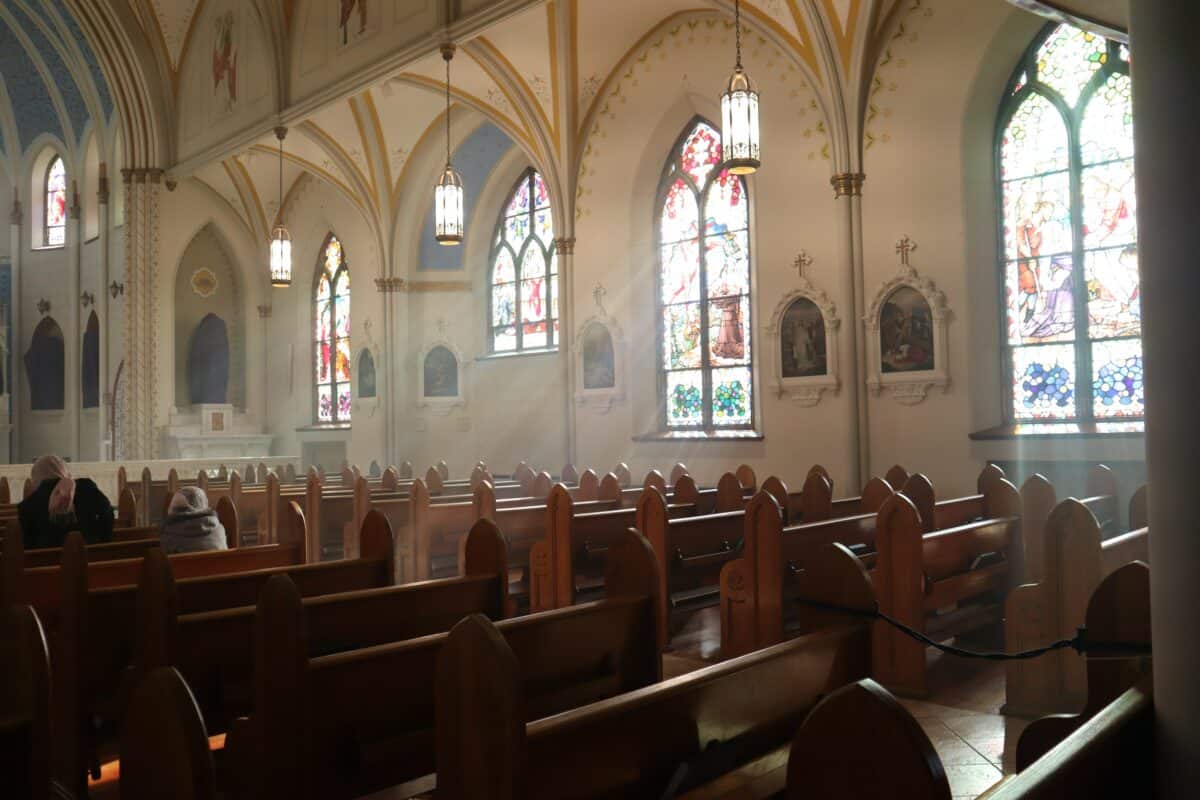New here? Join us in prayer! Click here to get novena reminders by email!

The word “novena” comes from the Latin word novem which means “nine” as they involve nine days of prayer for a specific petition or grace.
Novenas have long been a part of the Church’s spiritually treasury–both in public prayer and private devotion. But where did this practice originate?
A Scriptural Blueprint
We actually hear about the first “novena” in Sacred Scripture in Acts of the Apostles.
After the Ascension, Christ’s apostles alongside the Blessed Mother gathered together in the Upper Room and devoted themselves to constant prayer:
When they entered the city they went to the upper room where they were staying, Peter and John and James and Andrew, Philip and Thomas, Bartholomew and Matthew, James son of Alphaeus, Simon the Zealot, and Judas son of James.
All these devoted themselves with one accord to prayer, together with some women, and Mary the mother of Jesus, and his brothers (Acts 1:13-14).
Nine days later, the Holy Spirit descended upon them at Pentecost, pouring out grace and spiritual gifts.
These nine days became a model of prayer for many Christians, and have been used to develop several devotions that involve nine days or nine months of prayer for a specific intention.
Putting it into Practice
The practice of nine days of prayer for a specific purpose may have developed more widely in the Church by “baptizing” a similar ancient Roman practice.
The Romans would often celebrate nine days of prayer to avert a predicted tragedy, offer thanksgiving, or to mourn someone’s death. Similarly, the early Christians did have a custom of offering nine days of masses and prayers for a newly departed soul.
In addition to the novena of mourning, different types of novenas began to emerge over time.
Novenas of Preparation began in the Middle Ages, particularly in Spain, with the faithful praying an anticipatory novena leading up to Christmas. At this same time, Novenas of Petition rose in popularity in France and Belgium with prayers to particular saints to recover health.
During this period, some members of the Church hierarchy expressed concern with Novenas of Petition, as they feared the faithful might use this form of prayer superstitiously.
However, during the papacy of Pope Pius IX the Church officially recommended a large number of novenas, like the Novena to the Holy Trinity and the Immaculate Conception Novena by granting indulgences to those who prayed them. Having novenas recognized and approved by the Church paved the way for more widespread use of this devotion among the faithful.
As more novenas were written, novenas shifted from a primarily public devotion to a more private one, as people began calling on saints that held some personal significance to them.
Rooted in Our Creed
The belief in an eternal life and in the Communion of Saints have shaped the Catholic understanding of the intercession of saints since the days of the early Church. In fact, many Church Fathers and Doctors of the Church have spoken of its importance from as early as the 3rd Century.
In 1545, the Council of Trent explicitly defined the Church’s teaching on saintly intercession:
“…the saints who reign together with Christ offer up their own prayers to God for men. It is good and useful suppliantly to invoke them, and to have recourse to their prayers, aid, and help for obtaining benefits from God, through His Son Jesus Christ our Lord, Who alone is our Redeemer and Savior.”
Praying a novena allows a Catholic to pray alongside the Blessed Mother and the saints for a particular request. And because these saintly brothers and sisters stand before God in a very real and intimate way, their prayers for those on earth are particularly efficacious.
Novenas are rooted in the example of the early Christians and beliefs fundamental to our faith, and remain a meaningful tool to deepen the spiritual life of the faithful today.
You can search through our novenas and find one that fits for your personal intentions here.